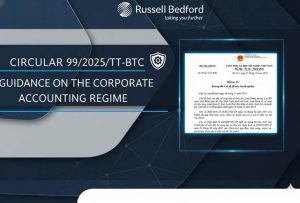On 20 March 2025, the Government issued Decree No. 70/2025/NĐ-CP (effective from 01 June 2025) amending and supplementing Decree No. 123/2020/NĐ-CP regarding invoices and records. In this article we discuss some key points that enterprises, household businesses, and individual businesses need to pay attention to.
Following this, the setup of E-invoice generated by POS cash register with network connection for transfer of electronic data to tax authorities (for entities providing goods and services directly to consumers) must be implemented immediately.
1. Electronic invoices for foreign suppliers engaging in e-commerce
Foreign suppliers without a permanent establishment in Vietnam, who conduct e-commerce activities, digital platform-based business, or provide other services, may voluntarily register to use e-invoices. Foreign suppliers engaged in e-commerce are permitted to use value-added tax (VAT) invoices.
Although the use of e-invoices by foreign suppliers is carried out on a voluntary registration basis, it can have a greater impact on individuals and organizations using their services in Vietnam. Specifically, service users will be able to declare and deduct input value-added tax (VAT) more conveniently compared to having to declare and pay contractor (withholding) tax.
2. Prohibition of invoice forgery and failure to transmit data to tax authorities
Additional prohibited acts have been added for organizations and individuals selling or supplying goods and services, and for those with related rights and obligations in the field of invoices and records:
- Forging invoices or records to perform illegal acts;
- Failing to transmit electronic data to the tax authorities as required by law.
As a result, electronic data of goods and service providers must be connected to and transmitted to the tax authorities. This requires investment in technical solutions to establish the connection and ensure continuous data transmission.
3. Additional subjects required to use e-invoices generated from POS cash registers
- Household businesses and individual businesses (as specified in Clause 1, Article 51, Law on Tax Administration No. 38/2019/QH14) with annual revenue of 1 billion VND or more.
- Enterprises engaged in the sale of goods or provision of services, including those that sell goods or provide services directly to end consumers.
The inclusion of new entities required to use e-invoices generated from POS cash registers under Decree 70/2025/NĐ-CP will have a significant impact across many businesses such as restaurants, hotels, shopping centers, supermarkets, retail, and entertainment… In essence, nearly all enterprises and household businesses that provide retail products or services directly to customers will need to promptly invest in and establish:
- POS Cash registers or integrated billing software at the point of sale/service to accurately record revenue data;
- Checking that POS cash register have function to issue e-invoice generation at the business location;
- Capability to establish a network connection to transmit data to the tax authorities.
This shift not only demands a technical and financial investment but also a change in operational workflows, especially for small and medium-sized businesses that previously used manual or less formal systems.
4. New regulations on the timing of invoice issuance
Invoice issuance timing for exported goods
For exported goods (including processing of goods for export), the time of issuing electronic commercial invoices, electronic VAT invoices, or electronic sales invoices is determined by the seller. However, it must be no later than the next working day after the goods have been granted customs clearance in accordance with the law on customs.
Invoice issuance timing for specific cases
- For cases involving frequent and large-volume sales of goods or service provision, where time is needed to reconcile data between the seller and the buyer:
The invoice issuance time is the point when data reconciliation between both parties is completed, but no later than the 7th day of the month following the month the service was provided, or within 7 days from the end of the agreed settlement period. - For exploration, extraction, and processing of crude oil: The time of issuing invoices for crude oil, condensate, and processed products is when the buyer and seller determine the official selling price, regardless of whether payment has been received.
- For the sale of natural gas, associated gas, and coal gas via pipeline: The invoice issuance time is when both parties determine the quantity of gas delivered for the month, but no later than the final day of the tax filing deadline for the month in which the tax obligation arises, as prescribed by the Law on taxation.
- For lending activities: The invoice issuance time is based on the interest payment term specified in the credit agreement between the credit institution and the borrower. If interest is not collected by the due date and is instead recorded off-balance-sheet (in accordance with credit extension regulations), the invoice shall be issued when interest is actually received. If interest is paid early under the agreement, the invoice is issued at the time of early payment.
- Regarding foreign currency exchange agency activities and provision of foreign currency receipt and payment services for economic organizations of credit institutions: The invoice issuance time is at the time of currency exchange or the time of completion of provision of foreign currency receipt and payment services.
- For passenger transportation by taxi using fare calculation software: At the end of the trip, the taxi transport enterprise or cooperative using fare calculation software must issue an e-invoice to the customer and transmit e-invoice data to the tax authority.
- For health facilities that use software for managing examination, treatment, fees: The facility must issue invoices to the social insurance agency when it receives reimbursement of costs of medical examination and treatment services provided for health insurance card holders.
- For traditional lottery and instant lottery businesses (pre-printed tickets sold at full face value): After reclaiming unsold lottery tickets and before the next drawing, the lottery business must issue an electronic VAT invoice (with a tax authority code) for each agent (organization or individual) for the quantity of tickets sold during the period, and submit it to the tax authority for grant of authentication code.
- For casino and prize-winning electronic game businesses: The electronic invoice must be issued no later than 01 day after the end of the revenue recognition day. At the same time, the business must send data recording the collected amount (from exchanging tokens at the counter, game tables, gaming machines) minus the amount paid to players. The revenue recognition day is from 00:00 to 23:59 of the same day.
5. Digital platform-based transport providers must record the shipper’s tax code
Enterprises providing freight transportation services via digital or in e-commerce platforms must include the following information: the name of the transported goods, and the name, address, tax identification number (TIN), or identification number of the shipper.
Suppliers of goods under this model will be subject to stricter information management, including the requirement to provide the tax code or identification number of the sender, enabling tax authorities to easily trace and verify transactions. This measure helps reduce cases of intentional underreporting or omission of transactions aimed at tax evasion.
6. Issuing invoices for promotional, gifted, or donated goods
- In cases of promotions for goods or services as prescribed by commercial law, or when goods or services are given, donated, or gifted in compliance with the law, it is permitted to issue a single invoice that records the total value of the promotional, donated, or gifted items, along with an attached list detailing those items.
- An invoice must be also issued to a client for each transaction at his/her request.
The provision allowing for the issuance of a single invoice stating the total value of promotional, gifted, or donated goods/services accompanied by a detailed list is a new point introduced in Decree 70, bringing greater convenience to businesses. It reduces the workload for sales departments, especially for companies that handle large volumes of promotional goods.
7. New guidance on when the digital signature timestamp differs from the invoice issuance time
- If the date of a digital signature on an issued e-invoice is different from the issuance date of the e-invoice, the date of the digital signature and the date on which the issued invoice is sent to the tax authority for grant of authentication code (for an authenticated invoice) or the date on which the e-invoice data is transferred to the tax authority (for an unauthenticated invoice) shall not be later than the working date following the issuance date of the invoice (unless data is sent using a datasheet as prescribed in point a.1 clause 3 Article 22s).
- The sellers file tax declaration based on the invoice issuance date. The buyers file tax declaration based on the date they receive the invoice, which is issued in the correct format and contains adequate information as prescribed in Article 10.
This guidance provides clarification for cases when digital signature timestamp differs from invoice issuing date for both buyers and sellers. The sellers declare according to their issuing date, while the buyers use their date of invoice receipt.
8. Removal of the regulation requiring cancellation of incorrect invoices
- Before replacing or correcting an issued e-invoice, there shall be a written agreement clearly stating the errors involved (when the buyer is an enterprise, economic organization, other organization, household business, or individual business). In case the buyer is a private individual, the seller shall inform erroneous invoice to the buyer or on the seller’s website.
- The seller is allowed to issue a single invoice to correct or replace multiple incorrect invoices for the same buyer in the same month.
Therefore, incorrectly issued e-invoices can still be corrected or replaced as before, but a written agreement between the seller and buyer is required. Previously, the invoice’s correction or replacement procedures were time-consuming and increased the workload for both businesses and tax authorities. The new regulation allowing one single invoice to replace or adjust multiple incorrect invoices issued within the same month for the same buyer at once will reduce the workload for accountants and tax officers, enhance data transparency and accuracy while saving time.
Need more information about e-invoices and tax regulations? Submit your questions via the link below, and we will get in touch.https://ktcvietnam.com/contact-us/


















